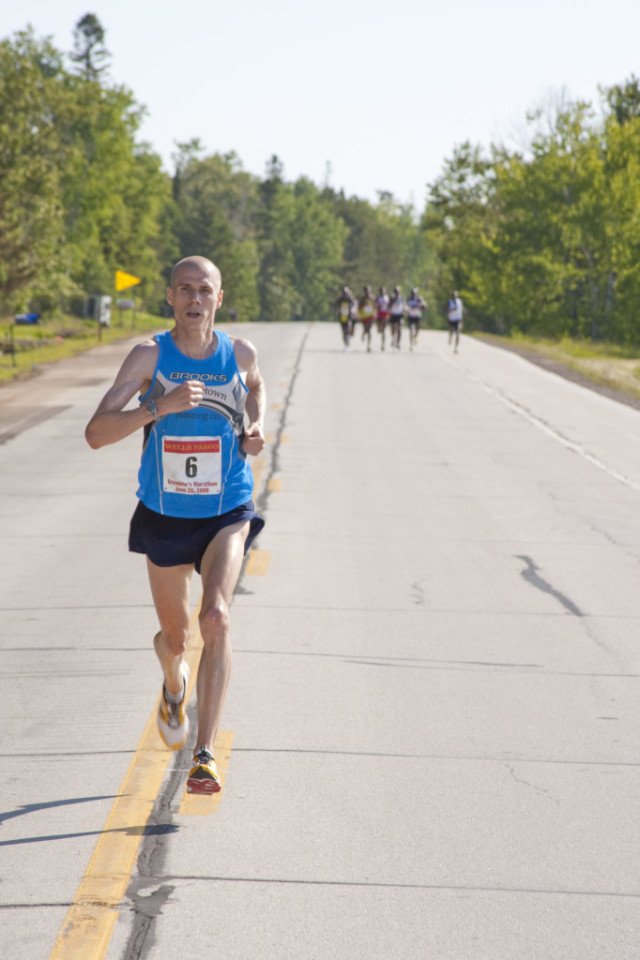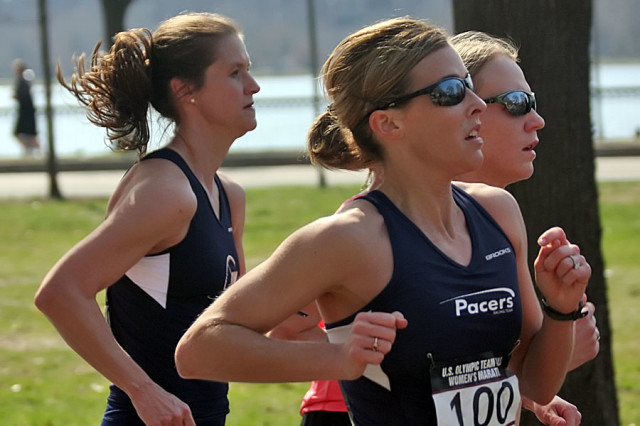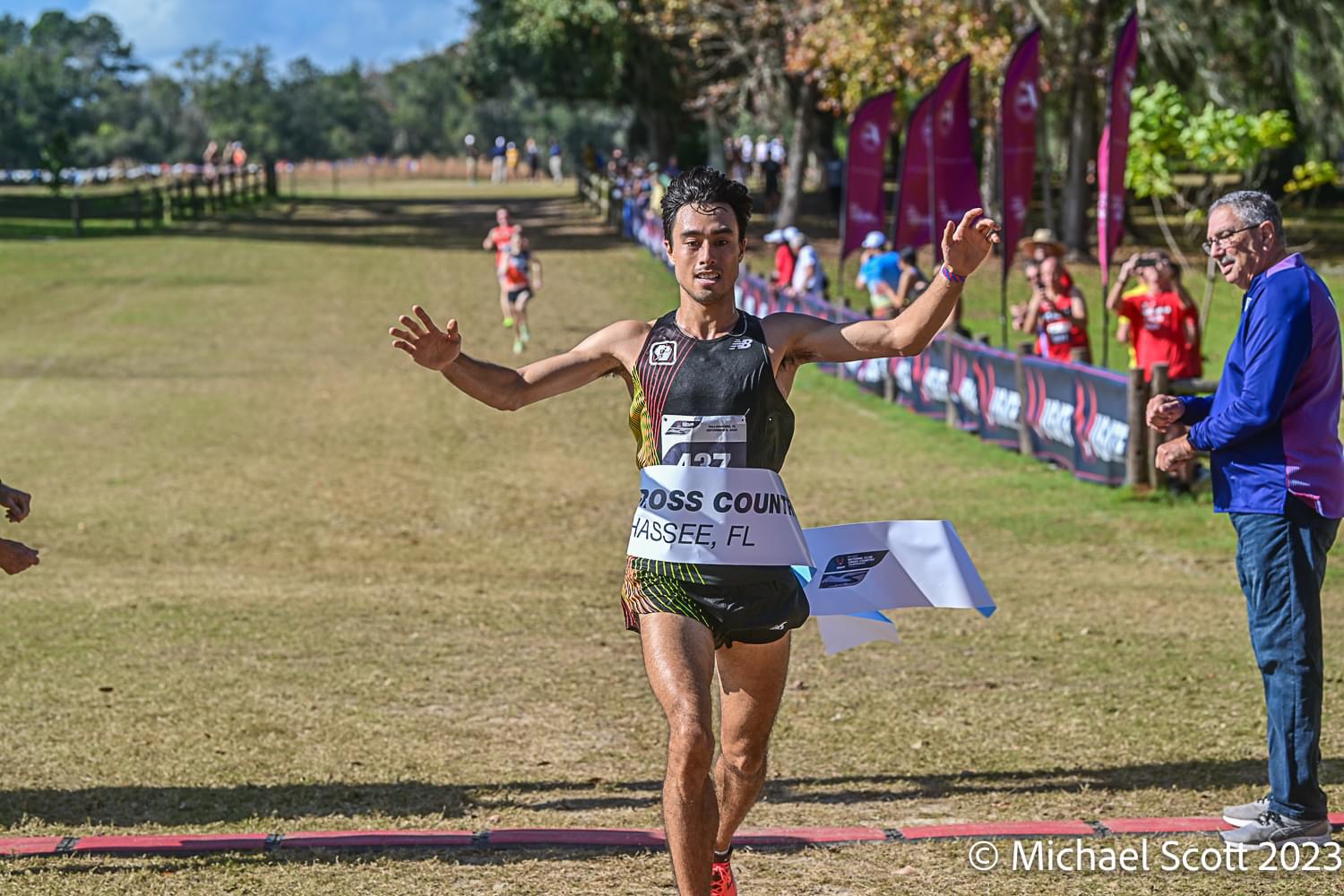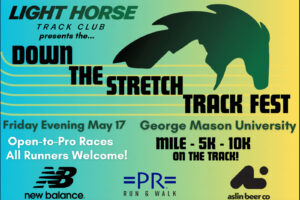
Running a marathon isn’t that hard, is it? You dedicate yourself to training for a few months, build up mileage and aim for a good effort on race day. I mean, some four million Americans crossed a marathon finish line last year, right?
Finishing, however, is one thing, and running well is another. How do you know if you’re ready to do more than simply endure? How do you know if you’re prepared to give it your best effort and run the marathon of your life?
Answers from some of this area’s best marathoners range from serendipity to grindingly hard work. The common thread is a confidence born of having done the workouts and logged the miles.
Better to Be Lucky …
While the science of training, diet, psychology and physiology — not to mention digital watches — have advanced over the decades, the surest way to run a good race remains to have good luck. Phil Stewart, now the Credit Union Cherry Blossom 10 Mile race director, is a case in point. Stewart ran his personal best 2:19:58 at the 1975 Boston Marathon, knocking more than six minutes off his best.
“That was a tailwind year,” Stewart says matter-of-factly. “I felt good throughout the race and at the finish thought I might have run 2:22 or 2:23, but I had no idea. In those days, splits were given in the middle of the various towns, like 6.7, 9.8 or 14.3. They didn’t even have a clock at the finish line.”
So Stewart finished what felt like a solid effort and relaxed in the depths of the Prudential Center parking garage, where race officials posted results as they became available. “I absolutely shrieked when I saw that I had broken 2:20,” Stewart says. “Years later I ran three hours exactly but never complained that I hadn’t gotten under — I had my two seconds when I needed them. I picked a good day to run well. People remember the time but they don’t remember the tailwind.”
Still, Stewart is too modest: he was 22nd that year and 15th at Boston in 1977, a hot year when he ran 2:22. “My [performance] curve was improving,” he admits. “I had been training well and was ready to run fast.”
Confidence is a given but hardly a guarantee for running well. The opposite, however — a lack of confidence — almost always ensures disaster.
“Most times going in you feel confident,” says Chris Raabe, who bettered his marathon best by almost two minutes when he ran 2:15:13 to win the 2009 Grandma’s Marathon in Duluth, Minn. “But it took me a long time to figure out that what you think you can run only happens when everything is absolutely perfect. And that actually never happens.”
Call it Raabe’s Rule: “Now I say if everything goes bad I should still be able to do this well.” And that philosophy worked for him at Grandma’s, where he won by more than three minutes. “It was not ideal,” he says of the conditions that day. “Seventy-five degrees and a headwind [on a point-to-point course]. But I was in good shape, knew what I could do and was able to hold it together at the end.”
It’s not as if Raabe came out of nowhere to win at Grandma’s. He competed at North Dakota State and in 2002 moved to D.C., where he often dominated local events and finished 16th at the 2009 U.S. Olympic trials marathon. He has a reputation as a monomaniacal trainer, regularly logging weeks of up to 150 miles. Raabe, now 35, qualified for the trials again in 2012 but injuries and a car accident kept him from competing.
Pick Your Spots
Karl Dusen, who lives in Ashburn, profiles as more of an optimist. As a husband and the father of two toddler girls who is trying to compete at a high level, a sunny disposition is probably required. But the story of Dusen’s breakthrough marathon isn’t complete without the background of his first, which was an unmitigated disaster.
Dusen had just graduated from Columbia University, where he had run 29 minutes flat for 10,000 meters, and felt ready to up the ante and the distance in his first marathon that fall. That it was his hometown race amid the hoopla and bedlam of New York City seemed like a good idea at the time.
“Everything went wrong,” Dusen says. “A bunch of friends were out watching, some were running, along with alumni, and we’d all been talking trash for weeks about who was going to do the best.”
Warm weather compounded the problem. Spurred on by Big Apple hype, Dusen went through halfway on his goal pace at 71 minutes. But he crashed in the second half and slogged home in 2:38.
“Despite a week of limping around [after the race], it didn’t take long to diagnose the problem,” Dusen says. “I wanted to get back at it and do it right.”
While working in New York’s financial district, Dusen ran mornings and evenings with the Manhattan Track Club in Central Park. About eight weeks prior to the Chicago Marathon, he completed a 23-mile training run, his longest ever, with the middle 11 miles at 5:15 per mile – just better than race pace.
“That run felt smooth and I knew in my heart that I was ready to go for it, despite what had happened before,” he says. His goal was to meet the 2007 Olympic trials qualifying standard of 2:22.
This time, Dusen escaped the fishbowl of New York for the relative anonymity and pancake-flat course of Chicago, where a group of some 20 men, all running to qualify, worked through 5:20 splits for the middle 15 miles of the race.
“That group pulled me through the hard part. But at the end, I was tired and slowing. I kept doing the math in my head, calculating what I needed to run [each of the final miles] to still qualify,” he says. Dusen needn’t have worried: he finished in 2:20:35, with splits of 70:17 and 70:18. The trials race itself — back in Dusen’s familiar Central Park stomping grounds — was mostly forgettable but for the accomplishment of participation.
Talent Never Hurts
Another area runner balancing competitive running with family life is former Georgetown University all-American Kristen Gordon Henehan, who lives in Kensington with her husband Michael and two young sons.
While Henehan won the 2007 Marine Corps Marathon in her first attempt at the distance, she could hardly be counted as a surprise. Her many accomplishments and drive throughout her collegiate career boded well for further success on the roads.
“Basically, I just brought up my mileage for the marathon,” says Henehan, who averaged 75 miles per week throughout much of college. “It was the marathon distance that I was unsure about.”
Her Marine Corps debut went smoothly enough – 2:51:14 – and she decided almost immediately to pursue a follow-up and attempt to meet the Olympic trials qualifying time of 2:48. So for 10 weeks after Marine Corps, she recovered, upped her mileage even further and increased her hard training efforts for the Rock ‘n’ Roll Marathon in Arizona.
“Marine Corps was such a positive experience, I was ready for more,” she says. “I thought with good conditions and the right effort, I could go faster.”
Unburdened by having answered the question as to distance, Henehan worked on speed throughout her tempo runs. Even after the marathon, her six-mile tempo runs felt easier and passed faster. “Quality in everything, including my long runs, went way up,” she says. “I was pretty sure I would have a good race in Phoenix.”
And she did, popping a 2:45:12 and qualifying easily for the Boston trials three months later. There, however, the rigors of progressing from a novice to an elite marathoner and her third marathon – all in the course of six months – caught up and Henehan finished 96th in 2:49:42.
“That race, I did have expectations,” she says. “I had run a 1:16 half one month earlier” – a time that translated to a very quick marathon – “and I started out too fast, finished too slow. The marathon isn’t like the track. It’s a whole different game.”

And the Answer Is…
This writer has run a number of marathons and if I had the answer as to how to run your best, I’d gladly share it. I’d also be a very rich man. Mostly, what I heard from the runners quoted above resonate with my marathon reality: train hard, be smart and get lucky.
More specifically, I ran Grandma’s on a tailwind day — unlike Raabe and embracing the luck of Phil Stewart — and rode that wave to an at-the-time personal best of 2:16. It should be noted that of the dozens of marathons I’ve run, that was the only one in which I ran negative splits.
I was also fortunate — or well prepared, take your pick — when I ran 2:16 and finished eighth at the 1992 Olympic trials marathon. That dispassionate and clinical description belies the fact that it was the race of my life.
I had determined early on to do everything within my control to make those trials my best marathon. Most importantly, and inexplicably to many of my friends and family, I quit my job in order to make training my sole focus. For several months, I ran twice a day and averaged more than 125 miles per week, which was manageable with a limited racing schedule, plenty of rest and the help of training partners and a great coach.
One month prior to trials, half a dozen of the best distance runners in Maryland gathered at a track in Rockville to knock out five repeat miles. A different runner led every interval but each mile was consistent at 4:45; I remember a group of high school kids apparently annoyed we were hogging their track but too intimidated by our effort to say anything.
Any lingering doubts regarding my fitness after that workout were dispelled when I finally raced 10K and easily beat a good field. I ran 30:16, 18 seconds off my PR.
But I was confident enough to pick myself to finish eighth in my best friend’s trials pool (yes, marathon geeks do that). On race day, I started conservatively while many others gambled that their best race would come off a fast pace on a warm morning. Anyway, I’ll always be proud of maximizing my marathon talent on the day and in the race when it mattered most.
So is there a secret to the marathon? Sure, lots of them. Always start with the Holy Trinity of miles, speedwork and long runs. Repeat for 10 weeks. Then add the equanimity and work ethic of Chris Raabe, the moxie and drive of Kristen Henehan, the talent and thoughtfulness of Karl Dusen, and most importantly two parts of Phil Stewart’s luck. With all that, you’re guaranteed to have a great race.
This story originally appeared in the July/August 2014 RunWashington.
Recent Stories
Down The Stretch Track Fest
Down The Stretch Track Fest is a track celebration!
A distance-focused track meet at George Mason University featuring community-to-pro-level races on Friday evening, May 17th.
New Balance merch, Aslin Beer, music all night, and announcers keeping you up-to-date on the
Run the Greenway
We are just days away from the 4th annual Run The Greenway Race and
spots are filling up fast! We don’t want any Jedi to be left behind at this year’s
5K, 10K, or 800-meter Kids Fun Run, or virtual







